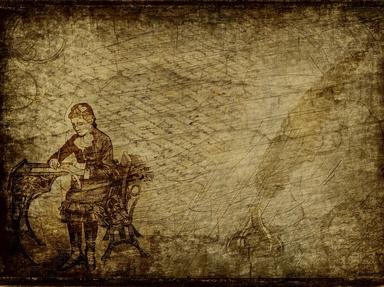Quiz Answer Key and Fun Facts
1. The action in the story of "Her Majesty's Servants" starts at Rawal Pindi in India. The scene is set with a description of the gathering of thirty thousand men with all their pack animals and armaments. Why were all these personnel gathered together in one place?
2. "Get out, quick! They're coming! My tent's gone!". Our narrator is warned of a coming disaster. He is warned that "they're coming!" Who are "they"?
3. So, in his haste to vacate his tent, our narrator went out into the slush covered ground while his dog, Little Vixen, went out through the other end of the tent. What type of dog is Little Vixen?
4. Using the muzzle of an artillery gun and two rammers our narrator makes a sort of wigwam with his waterproof as the roof. He is able to understand "camp-beast language" and listens into a conversation between a number of the camp animals. Which animal did NOT take part in the conversation?
5. One of the animals gathered close to the narrator belongs to an officer in the Ninth Lancers. Which officer does the animal name as his owner?
6. The most fearful of the animals are the baggage-camels. What was it that made the camels afraid that night?
7. During the night the older of the two mules is called a name by the younger mule. What name is he called?
8. Nearly all the troop horses in the English cavalry in India come from one specific country. Which Commonwealth country do these horses come from?
9. The troop-horse was aghast that the mules were not "bridle-wise". What did he mean by this phrase?
10. According to the troop-horse what is the worst kind of cowardice?
11. The troop-horse tells a story of one of the times when he was injured in combat. He states that he had been slashed across the chest once when a man who was lying on the ground wasn't actually dead. The horse had stretched himself not to step on him. In light of this action what did the horse decide to do, from now on, in battle?
12. "They say that when a mule trips you can split a hen's ear". What did Billy mean by this?
13. The gun-bullocks refer to a particular animal disparagingly as "Two Tails". Who, or what, is "Two Tails"?
14. The cavalry horse insulted the mule by referring to his parentage on his father's side. The mule, with great indignation, insulted the horse back. What did the mule call the horse that came close to starting a fight?
15. At the start of the story there is a four line verse mentioning Tweedle-dum and Tweedle-dee. But who originally created these two eponymous characters?
Source: Author
martinjudo
This quiz was reviewed by FunTrivia editor
LadyCaitriona before going online.
Any errors found in FunTrivia content are routinely corrected through our feedback system.
